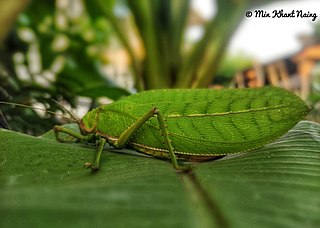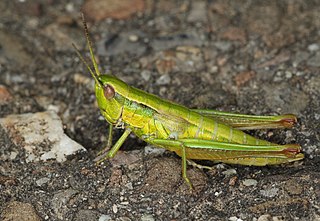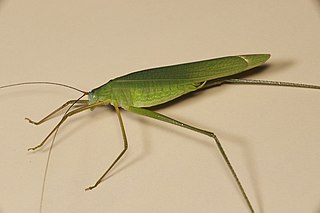
The grasshopper subfamily Acridinae, sometimes called silent slant-faced grasshoppers, belong of the large family Acrididae in the Orthoptera: Caelifera.

Euconocephalus is a genus of bush cricket in the 'conehead' tribe Copiphorini.

The subfamily Pseudophyllinae contains numerous species in the family Tettigoniidae, the katydids or bush crickets. Sometimes called "true katydids", together with the crickets of suborder Ensifera, they form part of the insect order Orthoptera which also contains grasshoppers.

The Phaneropterinae, the sickle-bearing bush crickets or leaf katydids, are a subfamily of insects within the family Tettigoniidae. They are also known as false katydids or round-headed katydids.

Gomphocerinae, sometimes called "slant-faced grasshoppers", are a subfamily of grasshoppers found on every continent but Antarctica and Australia.

Hexacentrus is the type genus of bush-crickets in the subfamily Hexacentrinae. Most species of this genus occur in Southeast Asia and in Africa.

Meconematinae is a subfamily of the bush crickets, with a worldwide distribution.

Mecopodinae are a subfamily of bush crickets found in western South America, sub-Saharan Africa, and Asia. In Asia, the distribution includes India, Indochina, Japan, the Philippines, and Malesia to Papua New Guinea and Australasia, including many Pacific islands.

The Copiphorini are a tribe of bush crickets or katydids in the family Tettigoniidae. Previously considered a subfamily, they are now placed in the subfamily Conocephalinae. Like some other members of Conocephalinae, they are known as coneheads, grasshopper-like insects with an extended, cone-shaped projection on their heads that juts forward in front of the base of the antennae.

Conocephalinae, meaning "conical head", is an Orthopteran subfamily in the family Tettigoniidae.

Agraeciini is a large tribe of bush crickets or katydids in the conehead subfamily, Conocephalinae.

Copiphora is a genus of bush crickets or katydids in the subfamily Copiphorinae (coneheads) from southern Mexico, Central America and South America, with a single doubtful species, C. subulata, from Africa.

Neoconocephalus is a genus of katydids or bush crickets in the tribe Copiphorini, from the Americas.

Orchelimum is a genus of katydid with 21 known species.

Ruspolia is a genus of bush crickets in the subfamily Conocephalinae. This genus includes species that may be called 'cone-heads', but the name has also been used for Conocephalus and other genera in the subfamily.
Xiphidiopsis is a genus of bush crickets in the subfamily Meconematinae. Species have been recorded from: India, China, Japan, Indochina, Malesia, and islands in the Indian Ocean and Pacific.

Elimaea is a large genus within Tettigoniidae, the bush cricket or katydid family. Species in this genus are found in India, southern China, Indo-China and Malesia.
Alloteratura is a genus of Asian bush crickets belonging to the tribe Meconematini. They are found in India, China, Indochina, and Malesia to New Guinea.

Gryllini is a tribe of crickets and typical of the family Gryllidae. Species are terrestrial, carnivorous or omnivorous and can be found in all continenents except Antarctica.





















